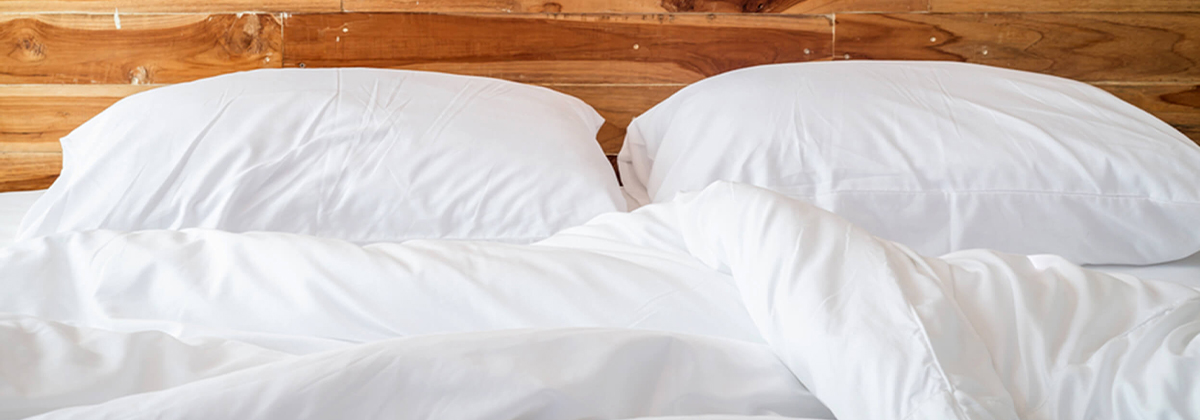21 Feb What is the Best Practice for Washing Bed Sheets?
Washing bed sheets are a routine for all of us, but we always delay or are lazy to wash them. The sheets are quickly dirty and need to be cleaned every other time. We spend about a third of our lives just sleeping in bed. During sleep, our body sweats and returns saliva, dead skin cells and excess body oils. All this dirt is absorbed in the bedsheets. Therefore, these sheets get dirty quickly and must be cleaned regularly to remove dust, bacteria, germs and other dirt.
Between 30,000 and 40,000 skin cells are shed from our bodies daily. Besides, dead skin cells absorb a lot of dust. Therefore, dirt and dust are poured on our sheets.
These substances are not harmful to us, but they cause various diseases such as skin problems and allergies in some people. If the sheets aren’t washed regularly, the bacteria in them will spread to your skin and lead to acne, eczema and other skin diseases. Dust is also an allergen that can cause allergies, runny nose, cough, etc., if it enters the nasal passages. It would be best if you washed your sheets at least once a week. Pillows and pillow’s covers should also be washed with the sheets at all times, as they also contain allergens and catheters. So they need regular washing to stay clean and healthy.
How to wash bed sheets
The sheets can be washed in different ways. In all methods, the following points are required.
- Put some sheets in your washing machine. Please don’t fill the washing machine, as they require more space for washing. If you overfill the washing machine, the sheets won’t be washed well.
- Before washing, remove stains by appropriate methods or by using chlorine-free or colourless bleach.
- Scrutinize sheet labels for information on the wash cycle and acceptable heat setting. Be sure to wash each sheet with only the same colours to save their colour. Wash dark colours in cold water so that it doesn’t fade.
- Avoid the overuse of detergents to make your sheets last longer. Too much detergent will wear out your sheets.
- Choose the right wash cycle. If you always wash your sheets with the strongest cycle, they will break down faster.
- If the sheets are filthy, you can use a hot water cycle to kill germs. Hot water helps to disinfect sheets, kill germs, viruses and allergens. But if you want your sheets to last a long time, you should avoid hot temperatures. The hot cycle wears out your sheets.
The first stage of washing bed sheets:
Wash new sheets with baking soda and vinegar. Chemical substances are added to sheets during the manufacture that can prevent them from becoming soft. Detergents lock in these chemicals, making the new sheets a little rougher. To wash new sheets, add a cup of baking soda and a cup of white vinegar to the wash cycle. Then you can use regular detergents. For regular sheets, use 1/4 cup full, and for heavily soiled sheets, use half a cup of laundry detergent. Use a quarter cup of lemon juice instead of bleach to lighten the sheets.
The second stage of washing bed sheets:
Silk and satin sheets should be cleaned with a mild detergent. Silk is a delicate fabric, so you have to be very careful about using detergent. Washing should also be with a cold and gentle water cycle, and avoid washing silk with heavier fabrics. Also, use a liner to dry silk sheets. If using the dryer, select the heat-free setting.
To clean satin sheets, you should choose a temperature of 40 degrees Celsius. In the final cycle, use a fabric softener to keep the sheets soft. But don’t use bleach. Frequent use of bleach can damage your sheets.
Wash your linens with detergent in a cold water cycle. Linen fabric is a durable fabric. Try using natural detergents.
The third level of washing bed sheets:
Save energy by drying your clothes and sheets on the clothing line. On a sunny day, hang white sheets in the sun and coloured sheets in the shade. Hang the sheets from the corners so that the wind doesn’t damage them. If it is raining or you don’t have a clothing line, you can use a dryer. Choose the proper dryer cycle. Medium or low heat is more suitable. This temperature will make your sheets more durable. Lay your sheets on the bed as soon as they come out of the dryer. This method will make the sheets look flat and ironed. Don’t put the sheets in the washer. The washer will cause wrinkles.
Cleaning the sheets keeps the body and mind healthy. People sleep better when their bedding is clean. So take care of your sheets to make them last longer.




Sorry, the comment form is closed at this time.